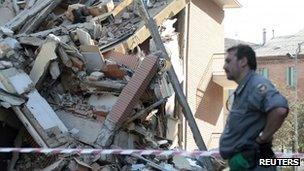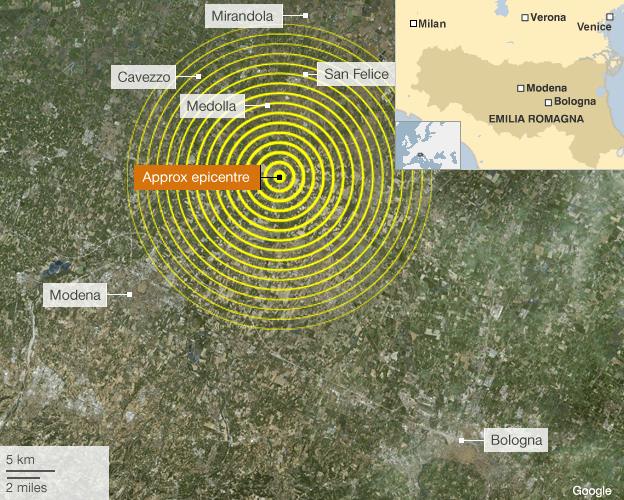New earthquake in northern Italy kills 16
- Published
Journalist Mark Dezzani in Modena: "It was certainly shaking for quite a few seconds"
A new earthquake has struck northern Italy, killing at least 16 people and injuring 200 others, officials say.
The magnitude 5.8 quake hit the Emilia Romagna region, damaging buildings and causing panic among residents living in tents after the earthquake on 20 May.
That quake killed seven people and caused significant damage to the region's cultural heritage.
The number of people made homeless has now gone up from 6,000 to 14,000, the Italian government says.
At least seven people are missing, and there are fears that a number of others may be buried under the rubble.
Prime Minister Mario Monti said his government would "do everything we must do and is possible to do in the shortest possible time to guarantee a return to normal life in this area, that is so special, so important, so productive for Italy".
Government troops have been sent to the affected areas, and an emergency cabinet meeting will be held on Wednesday.
'Feeling of waves'
Tuesday's quake struck 40km (25 miles) north of Bologna at a depth of 9.6km (six miles) at about 09:03 local time (07:03 GMT).
Thousands of residents ran out of buildings after the tremor, which was felt as far away as Venice and the Austrian border.
The towns of Mirandola, Medolla and Cavezzo were closest to the epicentre, but the northern cities of Milan and Bologna were shaken too.
Among the dead were four people in Mirandola, including two who were in a factory that collapsed. Three people also died in San Felice, and two in Cavezzo.
In Mirandola, the San Francis church collapsed, leaving only its facade standing.
Three people were killed at a factory that had only been cleared for re-entry on Monday, following the 20 May quake, the Corriere della Sera news website says.
A parish priest in the town of Rovereto di Novi is reported to have been killed by a falling beam when he went back into his church to save a Madonna statue.
"It's a disaster, I've never seen anything like it," Cavezzo Mayor Stefano Draghetti was quoted as saying by Reuters.
Christopher Gilbert, a Londoner living in Modena, said he felt "a rolling earthquake lasting around 15 seconds - people were quite frightened".
"I was having a coffee when the quake struck and felt a swaying motion so I clutched onto a bar in the cafe to steady myself. Schools and offices were evacuated," he told the BBC.
Chris Brewerton, living in Mantua, told the BBC that Tuesday's quake appeared stronger than the one on 20 May, which was 6.0 in magnitude. Mantua is 58km (36 miles) north of Modena.
"The chair starts shaking and there's a feeling of waves below me," he said. "I rush out into the garden; the shutters and garage door are banging, the ground below me swaying."
Industry hit
There were several aftershocks since, including a large one at about midday which sent people out into the streets in cities up to 100km away, the BBC's Mark Duff reports from northern Italy.
In Pisa, offices were evacuated as a precautionary measure while there were moments of panic in Venice, where a statue fell to the ground.
Pictures from the worst-affected areas show factories and office blocks reduced to rubble.

There are fears that a number of people may be still buried under the rubble
Firemen with dogs are now trawling through what remains of the buildings for survivors.
Calls to emergency services have overloaded the telephone network in some areas, causing a system blackout. Train services have been halted in some parts of northern Italy.
Emilia Romagna - one of Italy's most agriculturally productive areas famous for many delicacies - has been struggling to recover from the previous quake.
Reports say that Tuesday's tremor dealt a blow to the region's world-famous balsamic vinegar industry - after the previous quake nine days ago hit Parmesan production.
A friendly match between Italy and Luxembourg ahead of the Euro 2012 football championships, due to be played in the northern city of Parma on Tuesday, has been called off.
The 20 May quake destroyed many centuries-old buildings of cultural value. It was the worst to hit Italy since the L'Aquila tremor that killed nearly 300 people in 2009.

- Published29 May 2012
- Published29 May 2012